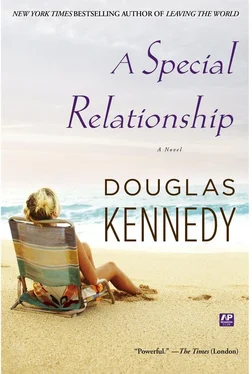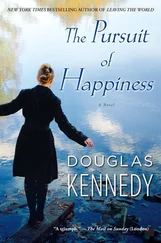'Never underestimate the male propensity for the clandestine... especially when it comes to sex. Were you devastated?'
'Yes, I was shattered. "The death of love" and all that. I read somewhere - I think it was in some Irish novel - that a divorce is worse than a death. Because you can't bury the bastard - and you know that he's off somewhere else, having a life without you'.
'And have you had a life - without him?'
'Good God, yes'.
'Anyone now?'
She took a deep drag on her cigarette.
'That's a rather direct question'.
'I'm a bloody Yank', I said, imitating her accent. 'Direct's my thing'.
'Well then to be bloody direct about it: yes, there was somebody. But it ended about six months ago'.
'I'm sorry'.
'I'm not'.
She then explained that, around the time of her divorce, the small publishers for whom she worked as an editor were gobbled up by a major conglomerate, and she was one of the casualties of this merger-and-acquisition ('They blamed it all on "economies of scale" whatever that means'.) At the time, she was living with her husband and her son Charlie in a large terraced house in Barnes. As part of the divorce settlement, Charlie resided with her, and she received just enough money to buy this cottage outright in Putney ('which puts me ahead of ninety-eight percent of the population of the planet, so I'm not complaining... even if the bastard only gives me £500 a month in child support'). But she had been able to find enough steady work as a freelance editor to keep her life ticking over.
'I make enough to give Charlie and myself a good life. And though I might not have a chap on hand right now, the fact that I still have Charlie for the next few years makes everything...'
She stopped and said, 'I'm sorry. That was thoughtless of me'.
'Don't be sorry. What you said is true. Which is why this is so fucking hard'.
'Once that list arrives tomorrow from the Law Society, find yourself a solicitor who's willing to fight your corner'.
'Against a rich woman with a lot of money and a big fat dossier of evidence against me? I doubt any solicitor is going to want to take me on', I said.
But the list arrived, and I discovered two things. Legal Aid wasn't entirely free. If you were destitute, with no assets, you could obtain legal representation without charge. But if, like me, you had no income, but did have part-ownership of a house, then the system operated more like a loan - in which all the costs you ran up eventually had to be repaid (with low interest, but interest nonetheless) from the eventual sale of said property. In other words, I'd be running up another debt - and one that would probably have to be settled once the house was sold from under me. At least, the legal aid rates were nothing compared to those charged by a private incompetent like Ginny Ricks.
The second thing I found out was that there were more than two-dozen solicitors within the borough of Wandsworth who handled Legal Aid cases. I didn't really know which one to choose, or where to start - so I just began to ring up every name alphabetically.
The first four solicitors on the list were otherwise engaged that morning - and, judging from what their secretaries told me, tied up for most of the week. But when I reached name number five on the list - Nigel Clapp - his secretary said that, yes, he could see me tomorrow at ten-thirty.
But as soon as I saw Nigel Clapp, I thought: no way. It wasn't just his spiritless appearance that I found disheartening. It was also his office. It was located in another sector of Wandsworth called Balham. As I was car-less and very conscious of costs, I decided to eschew a £10 minicab ride to this eastern corner of the borough, so I walked to the Putney rail station, changed trains at Clapham Junction, then rode two stops south to Balham. The trains were strewn with rubbish. The seats were stained. The carriages themselves were covered with graffiti. And the thing was: even though I still glanced with momentary distaste on such shabbiness, another part of me had come to be inured to such public squalor; to almost expect it as part of the territory. Is that what living in London did to you - make you accept the dilapidated, the shabby, as commonplace?
Balham High Road was the usual mixture of chain stores, and curious commercial left-behinds from the nine-teen-sixties (a shop that sold used professional hairdressing equipment), and the occasional signs of encroaching gentrification (designer cappuccino bars, designer modern apartment blocks). Nigel Clapp's office was located above a dry cleaner's in an archetypal redbrick Victorian house. I entered his premises by a door on a side street; a door with old-style frosted glass, on which had been painted the name Clapp & Co - Solicitors. I negotiated a constricted, ill-lit stairwell, reached another door and rang the bell. It was opened by a plumpish, matronly woman in her fifties, with what I had come to recognize as a pronounced South London accent.
'You the one here for the death cert?' she asked.
'I'm Sally Goodchild'.
'Who?' she said loudly, as if I was a little deaf. I repeated my name again. 'Oh, yeah, right', she said. 'The Legal Aid case. Come in. He's busy right now, but shouldn't be too long'.
Clapp & Co. comprised two rooms and a small waiting area, which was actually a narrow corridor, with a cheap sofa, two plastic potted plants, and a magazine rack, filled with six-month-old copies of Hello! and assorted estate agent magazines. The walls were painted a dirty shade of cream, the floors were covered in yellowing linoleum, the lighting was provided by two fluorescent tubes overhead. The sole decoration was a calendar on the wall from a local Indian take-away: With the Compliments of Bengal House, Balham High Road. The plumpish woman - Clapp's secretary and general dogs-body - worked in a small cramped office without a door. As I waited in the hallway - idly browsing through a magazine for the local branch of Foxton's Estate Agents, noticing with amazement that you could easily spend £750,000 on a family house around here - she answered a steady stream of phone calls with that brutish voice of hers, while working her way through an open packet of bourbon creams on her desk. After a few minutes, she got up and said to me, 'See if he's finally off the phone now'.
She walked over to the adjoining door, opened it without knocking, put her head inside it and said, 'Your client is here'.
Then I was ushered in to meet Nigel Clapp.
He did stand up when I entered. Then he offered me his dead mullet hand, and motioned me into the cheap orange plastic chair opposite his steel desk, and started shuffling through papers, and avoided my gaze. I noticed a couple of framed family photos on his desk, as well as a framed law degree. He must have spent a good two minutes going through my file, saying absolutely nothing, the only noise in the office coming from the traffic on Balham High Road, and the stentorian voice of his secretary next door. Clapp seemed oblivious to this high-decibel distraction - the way, I imagined, that people next to a railway track somehow became immune to the constant sound of rattling trains. My file was laid out across his desk. When he finally spoke, he didn't look up from the documents.
'So your former solicitor', he said in a voice so low and hesitant that I had to bend forward to hear him, 'she never sought leave to appeal the order of the Interim Hearing?'
'We parted company immediately after the hearing', I said.
'I see', he said, his voice non-committal, his eyes still focusing on the papers. 'And this business with the house... can you remember the names of the solicitors who handled the conveyancing?'
I told him. He wrote it down. Then he closed my file, and reluctantly looked at me for a moment.
Читать дальше












